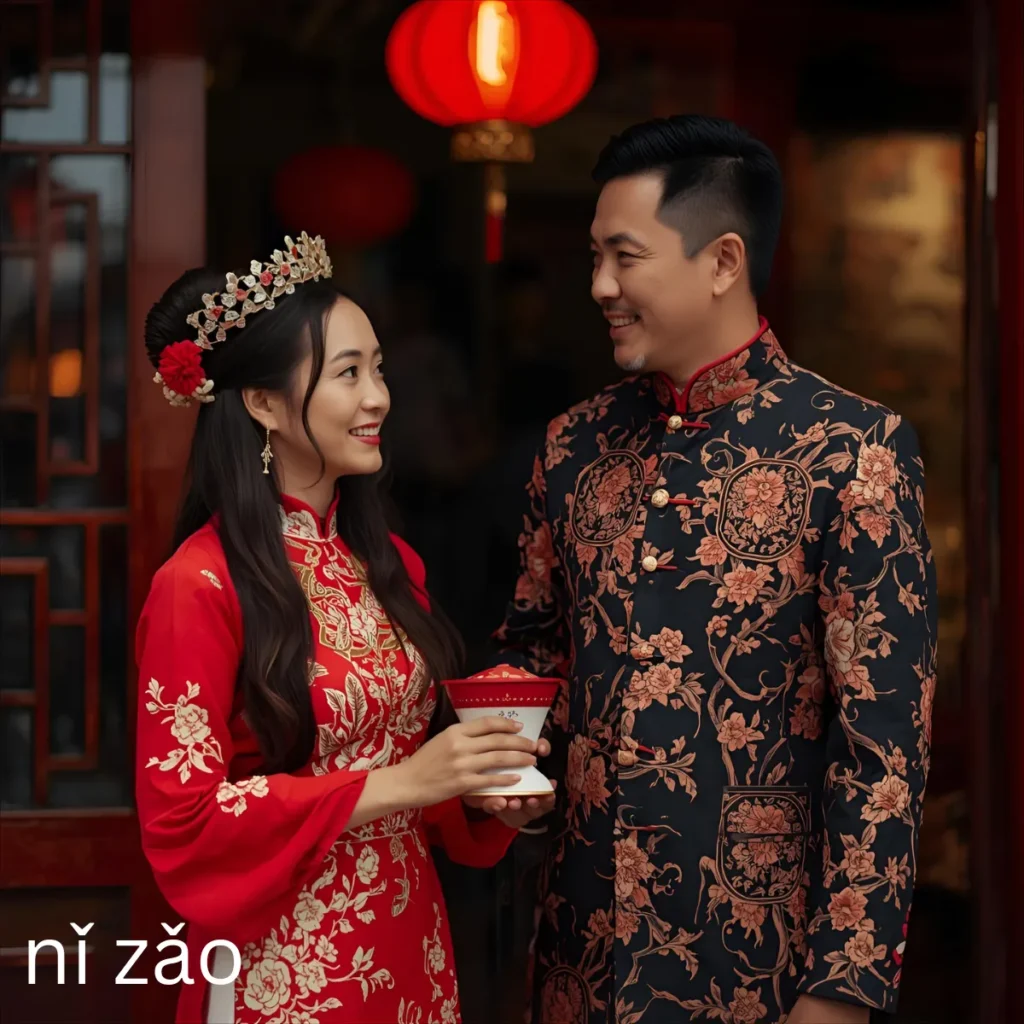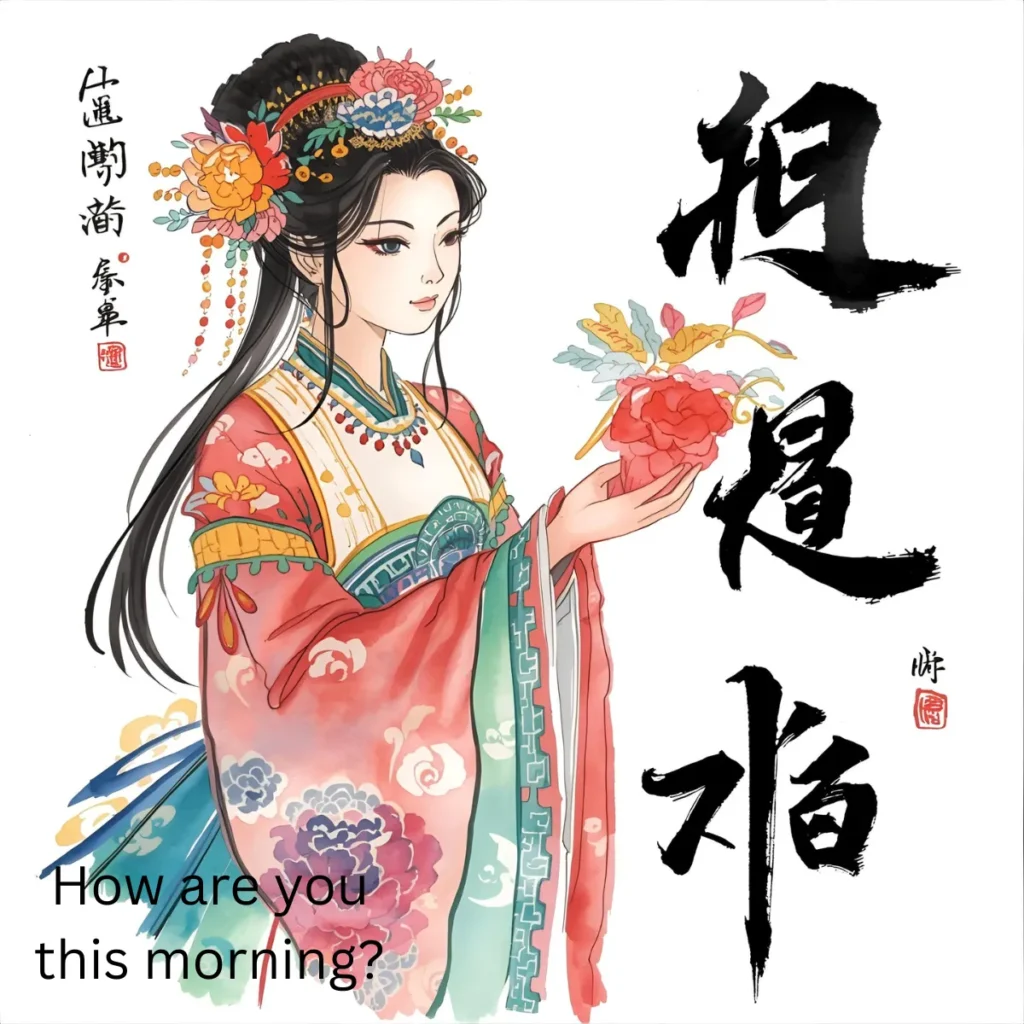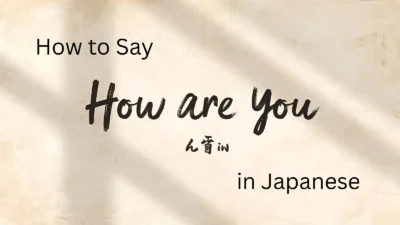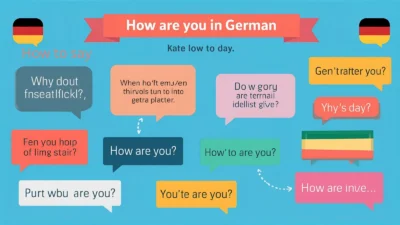Learning how to say good morning in Chinese is a simple yet powerful way to start your day with positivity and respect.
The most common phrase is “早上好 (zǎo shàng hǎo),” which you can use in both casual and formal settings.
Whether you’re greeting friends, colleagues, or meeting new people, knowing how to say good morning in Chinese will help you sound polite and make a great impression.
Good Morning in Chinese
Here’s a 15-phrases table showing different ways to say Good Morning in Chinese with meanings, phrases, pronunciation, and usage:
| # | English Phrase | Chinese Phrase | Pinyin | Usage / Context |
|---|---|---|---|---|
| 1 | Good morning | 早上好 | zǎo shàng hǎo | Standard polite greeting |
| 2 | Morning | 早 | zǎo | Very casual, like “Morning!” |
| 3 | Good morning (formal) | 您早 | nín zǎo | Respectful, to elders or superiors |
| 4 | Good morning, everyone | 大家早上好 | dà jiā zǎo shàng hǎo | Greeting a group |
| 5 | Good morning, teacher | 老师早上好 | lǎo shī zǎo shàng hǎo | Students greeting a teacher |
| 6 | Morning, friend | 朋友早 | péng yǒu zǎo | Friendly and casual |
| 7 | Good morning, sir | 先生早上好 | xiān shēng zǎo shàng hǎo | Polite, formal |
| 8 | Good morning, madam | 女士早上好 | nǚ shì zǎo shàng hǎo | Polite, formal |
| 9 | Good morning, everyone (casual) | 大家早 | dà jiā zǎo | Simple, casual |
| 10 | Good morning, colleague | 同事早上好 | tóng shì zǎo shàng hǎo | Workplace greeting |
| 11 | Have a good morning | 祝你早安 | zhù nǐ zǎo ān | Wishing someone a good morning |
| 12 | Good morning (poetic/literary) | 早安 | zǎo ān | Polite, often written |
| 13 | Morning sunshine | 早安阳光 | zǎo ān yáng guāng | Sweet, affectionate |
| 14 | Morning, dear | 亲爱的早安 | qīn ài de zǎo ān | To loved ones |
| 15 | Good morning, respected leader | 领导早上好 | lǐng dǎo zǎo shàng hǎo | Formal, workplace respect |
Let’s dive into the 15 ways to say good morning in Chinese, with real-life examples and cultural insights behind each one!
1. 早上好 (zǎo shàng hǎo) – Good Morning

Origin & Use:
This is the standard way to say “good morning” in Mandarin. It literally means “morning good.”
Example:
👤 User A: 早上好!你今天感觉怎么样? (Zǎo shàng hǎo! Nǐ jīn tiān gǎn jué zěn me yàng?)
👤 User B: 我很好,谢谢你!(Wǒ hěn hǎo, xiè xiè nǐ!)
Use: Polite and standard, suitable for formal or casual use.
2. 早 (zǎo) – Morning!
Origin & Use:
A casual, shortened version of “早上好.” Used among friends or coworkers.
Example:
👤 User A: 早!你来得真早!(Zǎo! Nǐ lái de zhēn zǎo!)
👤 User B: 是啊,今天有点事儿。(Shì a, jīn tiān yǒu diǎn shìr.)
Use: Informal, common in workplaces and schools.
3. 你早 (nǐ zǎo) – Morning to You

Origin & Use:
Literally means “you early.” A polite morning greeting in traditional Chinese etiquette.
Example:
👤 User A: 你早!(Nǐ zǎo!)
👤 User B: 你也早!(Nǐ yě zǎo!)
Use: Polite and respectful; older generation often uses it.
4. 老师早 (lǎo shī zǎo) – Good Morning, Teacher
Origin & Use:
In Chinese schools, it’s common to greet your teacher this way. Respect is deeply rooted in Chinese culture.
Example:
👤 Student A: 老师早!(Lǎo shī zǎo!)
👤 Teacher: 同学们早!(Tóng xué men zǎo!)
Use: Formal, used by students in school settings.
5. 大家早上好 (dà jiā zǎo shàng hǎo) – Good Morning, Everyone
Origin & Use:
Used when addressing a group, such as in meetings or classes.
Example:
👤 User A: 大家早上好!今天我们开始会议。(Dà jiā zǎo shàng hǎo! Jīn tiān wǒ men kāi shǐ huì yì.)
👤 User B: 早上好!(Zǎo shàng hǎo!)
Use: Formal group greeting.
6. 你今天好吗?(nǐ jīn tiān hǎo ma?) – How are you this morning?

Origin & Use:
Not a direct “good morning,” but commonly used after the greeting. Adds warmth.
Example:
👤 User A: 早上好,你今天好吗?(Zǎo shàng hǎo, nǐ jīn tiān hǎo ma?)
👤 User B: 挺好的,谢谢。(Tǐng hǎo de, xiè xiè.)
Use: Casual follow-up to morning greetings.
7. 清早好 (qīng zǎo hǎo) – Early Morning Good
Origin & Use:
A more poetic or literary version of “good morning.” Not common in everyday speech but used in writing or older texts.
Example:
👤 User A: 清早好,张先生!(Qīng zǎo hǎo, Zhāng xiān shēng!)
👤 User B: 早安!(Zǎo ān!)
Use: Formal or poetic.
8. 早安 (zǎo ān) – Morning Peace
Origin & Use:
Common in Taiwan and Hong Kong, “早安” is a gentle and elegant way to say good morning.
Example:
👤 User A: 早安,妈妈!(Zǎo ān, mā mā!)
👤 User B: 早安,宝贝。(Zǎo ān, bǎo bèi.)
Use: Formal and refined.
9. 朋友早 (péng yǒu zǎo) – Morning, Friend
Origin & Use:
Friendly and personal greeting, usually between close friends.
Example:
👤 User A: 朋友早!(Péng yǒu zǎo!)
👤 User B: 嘿,早!(Hēi, zǎo!)
Use: Informal and cheerful.
10. 老板早 (lǎo bǎn zǎo) – Morning, Boss
Origin & Use:
Used by employees or customers in small businesses in China to greet the owner or manager.
Example:
👤 User A: 老板早!(Lǎo bǎn zǎo!)
👤 User B: 早,今天早点来啊!(Zǎo, jīn tiān zǎo diǎn lái a!)
Use: Respectful workplace greeting.
11. 早上好呀 (zǎo shàng hǎo ya) – Good Morning (Playful)
Origin & Use:
Adding “呀 (ya)” makes it sound more friendly or childlike.
Example:
👤 User A: 早上好呀,小明!(Zǎo shàng hǎo ya, Xiǎo Míng!)
👤 User B: 哈哈,早呀!(Hā hā, zǎo ya!)
Use: Informal and cute.
12. 醒了吗?(xǐng le ma?) – Are You Awake?
Origin & Use:
Common in family or romantic settings, often used as a caring morning check-in.
Example:
👤 User A: 醒了吗?早餐做好了。(Xǐng le ma? Zǎo cān zuò hǎo le.)
👤 User B: 嗯,刚醒,谢谢!(Ňg, gāng xǐng, xiè xiè!)
Use: Very casual and intimate.
13. 哎,早啊!(āi, zǎo a!) – Hey, Morning!
Origin & Use:
Adding 哎 (āi) creates a laid-back, attention-catching tone. Common among friends.
Example:
👤 User A: 哎,早啊!(Āi, zǎo a!)
👤 User B: 早!去喝咖啡吗?(Zǎo! Qù hē kā fēi ma?)
Use: Informal.
14. 早起的鸟儿有虫吃 (zǎo qǐ de niǎo ér yǒu chóng chī) – Early Bird Gets the Worm
Origin & Use:
A proverb that can be used humorously to greet someone who’s up early.
Example:
👤 User A: 哇,你这么早!(Wā, nǐ zhè me zǎo!)
👤 User B: 早起的鸟儿有虫吃嘛!(Zǎo qǐ de niǎo ér yǒu chóng chī ma!)
Use: Playful, idiomatic.
15. 起床啦!(qǐ chuáng la!) – Time to Wake Up!
Origin & Use:
Used by parents, partners, or roommates to rouse someone in the morning.
Example:
👤 User A: 起床啦!太阳晒屁股了!(Qǐ chuáng la! Tài yáng shài pì gǔ le!)
👤 User B: 哎呀,好啦好啦!(Āi yā, hǎo la hǎo la!)
Use: Casual and affectionate.
Conclusion:
Knowing how to say good morning in Chinese gives you a warm and respectful way to start any interaction.
From casual chats with friends to polite greetings at work, these phrases help you sound natural and culturally aware. Adding this simple habit to your conversations will leave a lasting positive impression wherever you go.

Sophia Mitchell is a passionate content writer known for creating clear, engaging, and informative articles.
She focuses on delivering well-structured content that is easy for readers to understand and trust.
Sophia Mitchell currently contributes quality writing to repliesnest.com, helping readers find accurate answers quickly.



